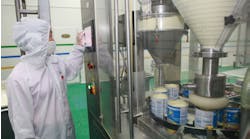Chemical Processing, in partnership with Chilworth Technology, Camfil Farr APC and Fike, recently hosted a live event that looked at various issues and developments related to dust and dust-collection systems.
Watch this on-demand event to gain insight into why some solids are valuable and so should be recovered, while others are wastes that must be collected so plants comply with emission standards. An added complication is that some dusts can ignite under certain conditions. New standards affect dust-collection systems that handle potentially explosive dusts, mandate dust analysis and risk evaluation, and impact the design of explosion venting equipment.
Presenters
Dr. Vahid Ebadat -- M.Inst.P, MIEE, C.Eng., C.Phys. -- CEO of Chilworth Technology, Inc. He has worked extensively as a process and operational hazards consultant for the chemical, pharmaceutical and food industries. Ebadat is a regular speaker at training courses on gas and vapor flammability, dust explosions, and controlling electrostatic hazards. He is a member of NFPA 77 Technical Committee on Static Electricity, NFPA 654 Standard for the Prevention of Fire and Dust Explosions from the Manufacturing, Processing, and Handling of Combustible Particular Solids and ASTM E27 Committee on Hazard Potential of Chemicals. Ebadat's research has culminated in the publication of numerous technical papers and articles.
John Dauber -- North American sales manager of Camfil Farr APC and has 18 years' experience in dust collection. Prior to joining Camfil Farr APC in 1998 as a regional sales manager, he held a range of sales engineering and sales management posts in the dust collection industry. He is responsible for Camfil Farr APC dust collection equipment sales throughout North America and oversees the company's U.S. regional sales managers, Canadian sales engineers and representative and distributor networks. Dauber has published numerous articles and white papers on dust collector selection, compliance and safety.
Bob Korn -- Director of Sales for Explosion Protection Products for Fike Corporation in Blue Springs, Missouri. He has received Bachelor of Science degrees in Business and Engineering from the University of Nebraska. Bob has spent the last 9 years with Fike Corporation, the global leader in industrial explosion protection solutions.
Guy Colonna -- Guy Colonna is the Division Manager, managing the Industrial and Chemical Engineering department for the National Fire Protection Association.
He has been with NFPA for 24 years and holds engineering degrees from the US Coast Guard Academy and Stanford University. He is also a registered professional engineer in chemical engineering in Massachusetts.
His responsibilities at NFPA include management of the Marine Chemist Training and Certification Program and NFPA activities dealing with marine fire protection. He also serves as Staff Liaison to committees dealing with safeguards at dust hazard process locations, explosives, industrial fire brigades, explosion protection systems including venting of deflagrations, and pyrotechnics and special effects.
Click here to watch now (registration is required, but only takes a few minutes. You will have instant access. Already registered, you will automatically go to the on-demand event.)

